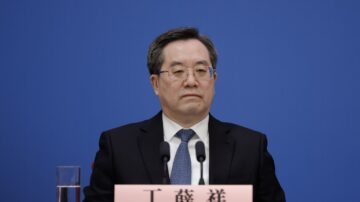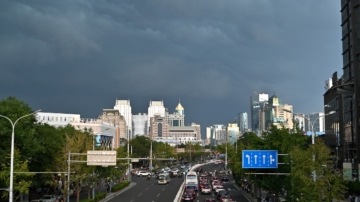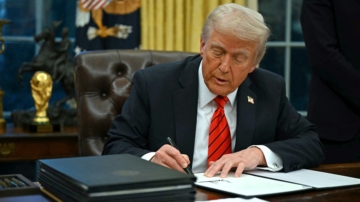【新唐人2014年02月28日讯】日前,中共当局下发信访新规定,明确规定不受理越级上访和“涉法涉诉信访”。分析人士指出,“信访制度”本身就是对“依法治国”的一种否定,无论是“逐级上访”或是“越级上访”,都无法真正解决问题。
据中共官方媒体《新华社》报导,中共中央办公厅和国务院办公厅——“两办”,最近发出关于解决信访突出问题的意见,《意见》中声称,要积极引导民众“逐级表达诉求,不支持、不受理越级上访”。
这则消息引发大陆民众热烈的讨论,网民“知青记者”在微博说:多年来,大家都感到地方政府胆大妄为,冤者由于对中央怀抱希望才变成访民,未变成暴民。“两办”此举,势必让地方政府更加胆大妄为,势必让更多访民变为暴民。
山东维权律师李向阳:“完善上访制度的目地就是把矛盾搞成一个缓冲地带,他并不是解决问题耶。无论是逐级上访还是越级上访,都是解决不了问题的。每一个访民跑到北京去的,都不是越级上访,他们在县、省已经上访多少年了,才到北京去的。”
北京维权人士李学惠:“信访本身就是对一个依法治国的否定,他还有越级、不越级啊,我们更多的人被这种体制弄的得脑残了。如果下面都解决的话,他有必要来越级吗?这种政治本身就是欺骗。”
这个禁止越级上访的所谓《意见》书,还有另一个重要内容,就是要求各级政府信访部门不再受理所谓“涉法涉诉”事项。《意见》书声称,要严格实行诉讼与信访分离,把“涉法涉诉信访”纳入法治轨道解决,建立所谓“涉法涉诉信访依法终结制度”。
但是,上海访民顾国平向《自由亚洲电台》表示,中国各地司法机关都受制于地方政府,诉讼、复议、仲裁等渠道也不畅通,访民想要告官,几乎没有胜诉的可能。
李向阳:“他把这种(涉法涉诉)上访事件全部推到司法部门去了,给访民归到各系统中去,更便于控制。假若中国的司法公正的话,就不会出现那么多信访案件了,就是它司法不公,才导致诉讼案件层出不穷。”
据了解,2011年5月,有不法商人勾结当地警方,企图侵吞山东临沂公民杨海龙的公司,而蓄意制造冤案将杨海龙判刑一年半有期徒刑。杨海龙出狱后,李向阳律师代理了他的冤案,却遭到临沂市兰山区警方的疯狂打压。兰山区警方为了阻止证人去法院协助调查,还对证人发布了逮捕令。去年8月,兰山区公安局甚至给李向阳扣上“涉嫌虚构事实,扰乱公共秩序”的罪名,将他行政拘留10天。
而北京维权人士李学惠,也因涉入“奥运劳教老人”王秀英起诉财政部有关援助韩国案,去年10月曾被警方带走。
李学惠:“我们完完全全遵守国家的法律程序的,到最后甚么结果呢?你总是要求民众做甚么,然后你自己做不做得到,即便老太太在这个过程中,涉法又如何,肯定是特别严格的。所以呢,即便涉法涉诉的事,他也不会做到(依法终结)。”
四川“六四天网”负责人黄琦接受《自由亚洲电台》采访时表示,他已经就《意见》书和很多访民进行沟通,访民们几乎一致认为,中国公、检、法系统充斥贪污腐败、行贿、受贿现象,各地冤假错案不断,根本不可能把“涉法涉诉信访”纳入法治轨道解决。
黄琦还说,民间普遍认为,《意见》书是中共为了应对“两会”期间的大规模上访潮,而推出的举措。
“中国社会科学院农村所社会问题研究中心”主任于建嵘在微博发帖说:任何强化信访制度的努力,都在破坏法治,都在祸国殃民。他质问当局﹕不准访民越级上访,那为何在北京设国家信访局?还有领导干部接访。
采访/张天宇 编辑/陈洁 后制/周天
Petition Reform: Don’t Skip Local Government
Petitioners: Cancel The Petitioning System
The recent petitioning reform by the Chinese Communist Party
(CCP) demands no bypassing local authorities and no lawsuits
associated petitions.
Analysts comment that the petitioning system represents the
breaking of the rule of law.
Any type of petitioning will not solve the problem.
According to Xinhua News Agency report, the general offices
of the CCP Central Committee and the State Council, released
a set of guidelines stating the authorities will not support or
accept petitions that bypass local officials.
Upon this release, a Chinese netizen “Young Journalist”
responded in the Weibo: “For years, we have been through
many daredevil deeds of the local authorities.
Victims became petitioners, rather than mobs, because they
still kept hope for help by the central government.
Beijing’s guidelines will only enhance the misdeeds of local
governments and turn petitioners into mobs.”
Li Xiangyang, human rights lawyer, Shandong: “A sound
petitioning system will be a buffer zone for conflicts, but still
will not solve the problem. None of the petitions will solve
the problem.
None of the petitioners to Beijing have skipped the local CCP.
They have tried and been through the local offices for years
before they turn to Beijing.”
Li Xuehui, Beijing activist: “Petitioning itself means the rule
of law has gone.
There is no so-called skipping the local authorities.
Many more of us have been fooled by this regime, and been
held back.
If the local authorities are capable of solving the problem,
would people bother to skip them?
These politics are basically deceptive.”
Another major detail of the guidelines is that the CCP will
not accept any petition involving lawsuits.
The guidelines will stick to the division between lawsuits and
complaints.
Any petition involving lawsuits will be diverted into the legal
system and ending its qualification for petitioning.
According to Shanghai petitioner Gu Guoping speaking to
Radio Free Asia, the judiciary system in China is subject to
regulation of the local authorities.
Legal channels and procedures are obscure. It is almost
impossible to win any lawsuit against officials.
Li Xiangyang: “They have diverted petitions relating to law to
the judiciary system.
The petitioners are diverted into various systems, and easier to
control.
If the judiciary system has been functioning, there would not
have been so many grievances and petitioners.
It is exactly because of the miscarriage of justice, that
endless lawsuits have occurred.”
For instance, in May 2011, collusion between police and
businessmen attempting to embezzle assets from a Linyi
citizen Yang Hailong’s company had Yang Hailong illegally
charged and sentenced to a year and a half in prison.
After his release, Yang Hailong commissioned attorney Li
Xiangyang to file a lawsuit.
Attorney Li Xiangyang has since undergone
a series of oppressions.
Local police had intervened in the witness report to the court
by issuing an arrest warrant for the witness.
Last August, attorney Li was charged by local police on
Alleged generating fictitious facts and disturbing public order.
Then he was detained for 10 days.
Beijing activist Li Xuehui was also abducted last October by
police for assisting activist Wang Xiuying to file a prosecution
case against the Ministry of Finance’s aid to North Korea.
Li Xuehui: “We have completely complied with the state
proceedings and what have we got out of it?
They just regulate the people.
An old lady is definitely petitioning over some serious issue.
They won’t solve it even it’s in the court.”
Founder of 64tianwang.com Huang Qi spoke to Radio Free
Asia, about his communication with petitioners over the
petition guidelines.
No one believes the courts will solve the grievances associated
with lawsuits, because of the corruption throughout the entire
judiciary and legal systems in China, as evidenced by the
endless lists of miscarriages of justice.
Huang Qi said that the petition reform guidelines are preparing
to defend against the massive number of petitioners expected
during the upcoming CCP parliament meetings.
Yu Jianrong, rural development researcher at the Chinese
Academy of Social Sciences, wrote on his Weibo:
“Any effort to strengthen the petitioning system is to break the
law and to ruin the people and the country.”
He questioned the authorities:”Why bother setting up the
petition bureau in Beijing with officials to handle petitioners
if petition beyond the local authorities is not allowed?”
Interview/Zhangtianyu Edit/Chenjie Post-Production/Zhoutian
据中共官方媒体《新华社》报导,中共中央办公厅和国务院办公厅——“两办”,最近发出关于解决信访突出问题的意见,《意见》中声称,要积极引导民众“逐级表达诉求,不支持、不受理越级上访”。
这则消息引发大陆民众热烈的讨论,网民“知青记者”在微博说:多年来,大家都感到地方政府胆大妄为,冤者由于对中央怀抱希望才变成访民,未变成暴民。“两办”此举,势必让地方政府更加胆大妄为,势必让更多访民变为暴民。
山东维权律师李向阳:“完善上访制度的目地就是把矛盾搞成一个缓冲地带,他并不是解决问题耶。无论是逐级上访还是越级上访,都是解决不了问题的。每一个访民跑到北京去的,都不是越级上访,他们在县、省已经上访多少年了,才到北京去的。”
北京维权人士李学惠:“信访本身就是对一个依法治国的否定,他还有越级、不越级啊,我们更多的人被这种体制弄的得脑残了。如果下面都解决的话,他有必要来越级吗?这种政治本身就是欺骗。”
这个禁止越级上访的所谓《意见》书,还有另一个重要内容,就是要求各级政府信访部门不再受理所谓“涉法涉诉”事项。《意见》书声称,要严格实行诉讼与信访分离,把“涉法涉诉信访”纳入法治轨道解决,建立所谓“涉法涉诉信访依法终结制度”。
但是,上海访民顾国平向《自由亚洲电台》表示,中国各地司法机关都受制于地方政府,诉讼、复议、仲裁等渠道也不畅通,访民想要告官,几乎没有胜诉的可能。
李向阳:“他把这种(涉法涉诉)上访事件全部推到司法部门去了,给访民归到各系统中去,更便于控制。假若中国的司法公正的话,就不会出现那么多信访案件了,就是它司法不公,才导致诉讼案件层出不穷。”
据了解,2011年5月,有不法商人勾结当地警方,企图侵吞山东临沂公民杨海龙的公司,而蓄意制造冤案将杨海龙判刑一年半有期徒刑。杨海龙出狱后,李向阳律师代理了他的冤案,却遭到临沂市兰山区警方的疯狂打压。兰山区警方为了阻止证人去法院协助调查,还对证人发布了逮捕令。去年8月,兰山区公安局甚至给李向阳扣上“涉嫌虚构事实,扰乱公共秩序”的罪名,将他行政拘留10天。
而北京维权人士李学惠,也因涉入“奥运劳教老人”王秀英起诉财政部有关援助韩国案,去年10月曾被警方带走。
李学惠:“我们完完全全遵守国家的法律程序的,到最后甚么结果呢?你总是要求民众做甚么,然后你自己做不做得到,即便老太太在这个过程中,涉法又如何,肯定是特别严格的。所以呢,即便涉法涉诉的事,他也不会做到(依法终结)。”
四川“六四天网”负责人黄琦接受《自由亚洲电台》采访时表示,他已经就《意见》书和很多访民进行沟通,访民们几乎一致认为,中国公、检、法系统充斥贪污腐败、行贿、受贿现象,各地冤假错案不断,根本不可能把“涉法涉诉信访”纳入法治轨道解决。
黄琦还说,民间普遍认为,《意见》书是中共为了应对“两会”期间的大规模上访潮,而推出的举措。
“中国社会科学院农村所社会问题研究中心”主任于建嵘在微博发帖说:任何强化信访制度的努力,都在破坏法治,都在祸国殃民。他质问当局﹕不准访民越级上访,那为何在北京设国家信访局?还有领导干部接访。
采访/张天宇 编辑/陈洁 后制/周天
Petition Reform: Don’t Skip Local Government
Petitioners: Cancel The Petitioning System
The recent petitioning reform by the Chinese Communist Party
(CCP) demands no bypassing local authorities and no lawsuits
associated petitions.
Analysts comment that the petitioning system represents the
breaking of the rule of law.
Any type of petitioning will not solve the problem.
According to Xinhua News Agency report, the general offices
of the CCP Central Committee and the State Council, released
a set of guidelines stating the authorities will not support or
accept petitions that bypass local officials.
Upon this release, a Chinese netizen “Young Journalist”
responded in the Weibo: “For years, we have been through
many daredevil deeds of the local authorities.
Victims became petitioners, rather than mobs, because they
still kept hope for help by the central government.
Beijing’s guidelines will only enhance the misdeeds of local
governments and turn petitioners into mobs.”
Li Xiangyang, human rights lawyer, Shandong: “A sound
petitioning system will be a buffer zone for conflicts, but still
will not solve the problem. None of the petitions will solve
the problem.
None of the petitioners to Beijing have skipped the local CCP.
They have tried and been through the local offices for years
before they turn to Beijing.”
Li Xuehui, Beijing activist: “Petitioning itself means the rule
of law has gone.
There is no so-called skipping the local authorities.
Many more of us have been fooled by this regime, and been
held back.
If the local authorities are capable of solving the problem,
would people bother to skip them?
These politics are basically deceptive.”
Another major detail of the guidelines is that the CCP will
not accept any petition involving lawsuits.
The guidelines will stick to the division between lawsuits and
complaints.
Any petition involving lawsuits will be diverted into the legal
system and ending its qualification for petitioning.
According to Shanghai petitioner Gu Guoping speaking to
Radio Free Asia, the judiciary system in China is subject to
regulation of the local authorities.
Legal channels and procedures are obscure. It is almost
impossible to win any lawsuit against officials.
Li Xiangyang: “They have diverted petitions relating to law to
the judiciary system.
The petitioners are diverted into various systems, and easier to
control.
If the judiciary system has been functioning, there would not
have been so many grievances and petitioners.
It is exactly because of the miscarriage of justice, that
endless lawsuits have occurred.”
For instance, in May 2011, collusion between police and
businessmen attempting to embezzle assets from a Linyi
citizen Yang Hailong’s company had Yang Hailong illegally
charged and sentenced to a year and a half in prison.
After his release, Yang Hailong commissioned attorney Li
Xiangyang to file a lawsuit.
Attorney Li Xiangyang has since undergone
a series of oppressions.
Local police had intervened in the witness report to the court
by issuing an arrest warrant for the witness.
Last August, attorney Li was charged by local police on
Alleged generating fictitious facts and disturbing public order.
Then he was detained for 10 days.
Beijing activist Li Xuehui was also abducted last October by
police for assisting activist Wang Xiuying to file a prosecution
case against the Ministry of Finance’s aid to North Korea.
Li Xuehui: “We have completely complied with the state
proceedings and what have we got out of it?
They just regulate the people.
An old lady is definitely petitioning over some serious issue.
They won’t solve it even it’s in the court.”
Founder of 64tianwang.com Huang Qi spoke to Radio Free
Asia, about his communication with petitioners over the
petition guidelines.
No one believes the courts will solve the grievances associated
with lawsuits, because of the corruption throughout the entire
judiciary and legal systems in China, as evidenced by the
endless lists of miscarriages of justice.
Huang Qi said that the petition reform guidelines are preparing
to defend against the massive number of petitioners expected
during the upcoming CCP parliament meetings.
Yu Jianrong, rural development researcher at the Chinese
Academy of Social Sciences, wrote on his Weibo:
“Any effort to strengthen the petitioning system is to break the
law and to ruin the people and the country.”
He questioned the authorities:”Why bother setting up the
petition bureau in Beijing with officials to handle petitioners
if petition beyond the local authorities is not allowed?”
Interview/Zhangtianyu Edit/Chenjie Post-Production/Zhoutian







